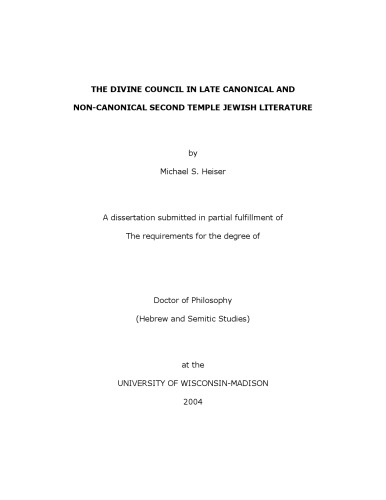

Most ebook files are in PDF format, so you can easily read them using various software such as Foxit Reader or directly on the Google Chrome browser.
Some ebook files are released by publishers in other formats such as .awz, .mobi, .epub, .fb2, etc. You may need to install specific software to read these formats on mobile/PC, such as Calibre.
Please read the tutorial at this link: https://ebookbell.com/faq
We offer FREE conversion to the popular formats you request; however, this may take some time. Therefore, right after payment, please email us, and we will try to provide the service as quickly as possible.
For some exceptional file formats or broken links (if any), please refrain from opening any disputes. Instead, email us first, and we will try to assist within a maximum of 6 hours.
EbookBell Team

4.8
44 reviews
ISBN 13: 9780496753666
Author: Michael S Heiser
Biblical scholarship has reached a consensus with respect to the presence of a divine assembly of gods in Israel's faith. Prior to the sixth century B.C.E., Israelite religion underwent an evolution from an initial polytheism to a firm monolatry, where the other gods of the divine council were tolerated but not worshipped. The religious crisis of Israel's early sixth century B.C.E. exile prompted the scribes to obscure the council in the canonical texts and compose new material declaring that Yahweh had punished Israel for her sins, brought her out of bondage, and put the other gods to death. This historical turnabout and its literary response marked the birth of true monotheism in Israel, where no other gods existed except Yahweh.
This consensus is plagued by numerous difficulties. There are hundreds of references to other gods in a divine council in exilic and post-exilic canonical texts and the non-canonical writings of Judaism's Second Temple period. The context for these references disallows the conclusion that the writers are speaking of idols or of the beliefs of pagans. Rather, they reflect the worldview of late Israelite religion and Second Temple Judaism. This worldview included the belief in a deified vice-regent who ruled the gods at the behest of the high God. So transparent was this divine vice regency that Second Temple Jewish authors wrote of a deified second power in heaven. The rhetoric of Deuteronomy and Deutero-Isaiah that there are no other gods besides Yahweh fails to prove the consensus view, since the same language is used in monolatrous pre-exilic texts and fails to account for the plethora of references to other gods in late Jewish writings.
Chapter One: Introduction to the Study
1.1 Previous Divine Council Scholarship and the Need for This Study
1.2 Divine Plurality in Late Canonical Texts and Assumptions About Israelite Monotheism
1.3 The Problem of Divine Plurality in Second Temple Non-Canonical Jewish Literature
1.4 Comments on Metaphor and Divine Imagery
1.5 Overview of Ensuing Chapters
Chapter Two: The Divine Council of Pre-Exilic Israelite Religion as the Backdrop for Divine Plurality in Late Canonical and Non-Canonical Texts
2.1 Terminology for the Divine Council
2.2 The Meeting Place of the Divine Council
2.3 The Members of the Divine Council
2.4 The Structure and Operation of the Divine Council’s Bureaucracy
2.5 The Status and Role of the Vice-Regent
2.6 Interpretation of Divine Hypostases and the Vice-Regent in Second Temple Texts
Chapter Three: Assumptions of Exilic Redaction and the Progression from Polytheism to Monotheism: The Argument from Deuteronomy 32 and Psalm 82
3.1 Text-Historical Assumptions and Late Israelite Religion
3.2 The Argument for Exilic Alteration or Elimination of the Divine Council
3.3 Psalm 82: Yahweh-El or Yahweh and El?
3.4 The Relationship of Deuteronomy 32:8-9 to Psalm 82
3.5 Summation
Chapter Four: The Divine Council and Monolatry in Deuteronomy and Deutero-Isaiah
4.1 Deuteronomy: Monotheism or Monolatry?
4.2 Deutero-Isaiah: Monotheism or Monolatry?
4.3 Summation
Chapter Five: The Divine Council in Exilic and Early Post-Exilic Canonical Texts
5.1 Divine Plurality and Divine Council Motifs in Late Psalms
5.2 Divine Plurality and Council Activity in the Book of Job
5.3 The Divine Council Scene of Zechariah 3:1-7
5.4 Divine Council Terms and Motifs Elsewhere in Zechariah
5.5 Summation
the divine council in the pentateuch
the divine council pdf
the divine council book
the divine council bible
divine council catholic
Tags: Michael S Heiser, council, canonical